Peter MALONE
Saturday, 09 October 2021 13:00
Strange But True
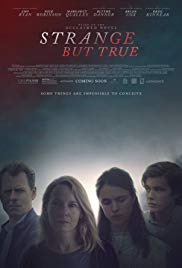
STRANGE BUT TRUE
US, 2019, 96 minutes, Colour.
Nick Robinson, Amy Ryan, Greg Kinnear, Brian Cox, Margaret Qualley, Connor Jessup, Blythe Danner, Allegra Fulton.
Directed by Rowan Athale.
An intriguing title – for an emotional mystery rather than thriller.
For those who watch murder mysteries or for those who read Detective stories, it is likely that they will work out what has been happening as the film goes on so that the final twist may well not be a twist for them but something that they had been anticipating. So, a surprise ending for some, the expected for others.
The film starts with an intriguing pursuit through the woods, the hero in danger. And then, the announcement of two days earlier. We get to know who is being pursued but not the identity of the pursuer.
This is very much a film about family. We soon learn that the older son of the family has been killed in a road accident (visualised at the end of the film). It is five years since he has died. His mother is angry and bitter (rather an understatement) and is played intensely by Amy Ryan. She and her husband, Greg Kinnear, have separated after the accident and he has married again, living in Florida. There is a second son, Philip, played by Nick Robinson, who lives at home but has been involved in an accident and is walking on crutches, edgy with his mother.
And then the plot becomes rather strange – even as we suspect that the situation is not true. The older son’s girlfriend comes to visit, visibly pregnant, announcing that the dead son is the father! What to think? Virginal conception – some background information on that possibility. Frozen sperm – and the mother follows that line of investigation. Likely candidates for the father? Yes.
The plot veers towards drama about Philip, his concern about the pregnant woman, hearing about her dabbling in magic and psychics, his own visit to a psychic who reads him very effectively (and does remark that a psychic needs a very good memory as well) and challenges him to do something with his own life, finding confidence in unburdening to the young woman.
The young woman, Melissa (Margaret Qualley) works at a local hardware store, is cared for by a benign couple, Brian Cox and Blythe Danner, the young woman being something of a substitute daughter.
There are further developments and plot revelations which means that all the central characters are present at the end – and we see the initial chase again, and quite some melodramatics.
As mentioned, a surprise ending for some, the expected for others, and strong performances from the cast. And, eventually, some hope.
1. The title? Expectations?
2. The town, homes, the roads, cottages, the library, hospitals, the prom? The contrast with the Florida sequences? The musical score?
3. Philip, the chase, crutches, pursuit? Going back to days, further flashbacks? The return to this sequence?
4. Melissa, her visit, her story, Ronnie dead for five years, her sense of his spirit, the mysterious pregnancy? Philip and his response, more sympathetic? Charlene and her anger? Issues of virginal conception? Issues of frozen sperm, the leads, Charlene’s research? Male candidates for fatherhood, Bill, Richard?
5. Charlene, her experience, anger, bitterness, Philip and his meals, the impact of the accident, anger and grief, Richard leaving, his marrying Holly? Her reaction to Melissa? The memories of Ronnie, her grudge against the librarian and the explanation, researching frozen sperm? Visiting Gail, the information about the payment of the rent, phone calls to Richard, meeting him at the airport, standing on the bridge, the accusations? Philip’s phone call, the searching? The sense of dread of the house, meeting Bill? The melodrama and confrontation?
6. Richard, his memories, his explanation about the situation, Charlene not helping him with his grief? Meeting Melissa, paying the rent? His relationship with Holly? Practising in Florida? Coming to New York? The encounter with Charlene, his explanations? Sharing the search for Philip?
7. Philip, his age, his friendship with Ronnie, grief at his death? Melissa’s visit, his sympathy, the frozen sperm? Visiting Chantrelle, her psychic reading of him, encouraging him? His telling his true story to Melissa? The accident and its consequences? His decision to help Melissa, the visit, about to give birth? Discovering the truth about Bill? The pursuit? Bill taking him, hitting him, preparing to bury him? His grabbing Bill’s legs, the fight, the rescue?
8. Bill and Gail, a pleasant couple, 30 years, no children, responsibility for Melissa? Bill and his deception about the smoking? The tablets and Gail discovering them? His past, police, his work, the shop? The truth, Gail, her disappointment, confrontation, the fight, her death?
9. Melissa, the car, driving herself to the hospital, giving birth?
10. Philip, the rescue? The confrontation with Bill, Bill’s killing himself?
11. The expected turn of events for many audiences? Twists for others? Questions about Melissa, the men and impregnation? The flashbacks to the prom, her memories, the foolishness of Ronnie’s death?
12. The birth of the baby, and the family gathering together, some unity and reconciliation?
Published in Movie Reviews
Published in
Movie Reviews
Saturday, 09 October 2021 13:00
Fiddler: A Miracle of Miracles
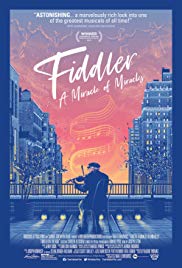
FIDDLER: A MIRACLE OF MIRACLES
US, 2019, 92 minutes, Colour.
Directed by Max Lewkowicz.
The fiddler is, of course, the Fiddler on the Roof. This is a film, most definitely, for all those who have treasured the stories written by Ukrainian author, Sholem Aleichem, writing at the beginning of the 20th century and who statue stands in Kyiv today. It is also for those who treasure the musical theatre version of tevye and his family, for those who treasure the film version of 1971 with Topple. It is a film for anyone who has any affection, large or small, for Fiddler on the Roof. It is most enjoyable.
In fact, this film could be seen as a Master Class about the origins and development of musical theatre. But only every aspect of the musical and the film version, it places the origins in the first half of the 1960s and the United States, reminding us of the extraordinary changes between the first Broadway performances in 1964 and the release of the film in 1971 – American civil rights, the experience of the Vietnam war, campus protests, wars and refugees, the moon landing…
This documentary opens with wonderful vistas of New York City, the violin melodies of the musical, finally our discovering a Fiddler sitting on his balcony overlooking the Hudson. The melodies at once invite us into further explorations and enjoyment.
Within 92 minutes, this film enables us to appreciate the narrative of Tevye and his family and the impact of the problems in 19th and early 20th century Russia. Throughout, we see stage excerpts of the musical, significant clips from the film, and a variety of versions of all the songs. It is a very satisfying memoir of experiences, stage and screen.
An interesting feature is that actor Joel Grey is putting on a performance of Fiddler but in Yiddish – and with stage experts and some songs in Yiddish.
Great tribute is paid to the writer of the original stories, Sholem Aleichem, – and we even see some excerpts from silent film versions of the stories.
There is a wonderful array of talking heads for this documentary, including footage of the contributors when they were young as well as 50 years later: the composer, Jerry Bock, the lyricist, Sheldon Harnick, writer, Joseph Stein. It is intriguing to hear how the songs came to be, melodies by Bock sent to Harnick and his linking his ideas to the music. The producer on Broadway was the redoubtable Hal Prince who chose the sometimes irascible choreographer, Jerome Robbins (West Side Story). Is quite exhilarating to see how Robbins created his choreography, rehearsals and performance, based on Jewish weddings and dances, religious experiences. Focuses also on the production design.
The tryouts and rehearsals were in Detroit and received harsh reviews, Robin’s continuing to prune and change. But, instantly, Fiddler on the Roof was a huge success and starred Zero Mostel as Tevye. Throughout the documentary a number of the actors who portray Tevye have an opportunity to explain their interpretation as well as sing.
When it comes to the film, there is some surprise to find that Norman Jewison was not Jewish (with the suggestion that he convert and his name become Norman Kristiansen!). He went to Russia to film, using the locations for persuasive authenticity. Chaim Topol was playing Tevye in London and was chosen for the film – a comment being made that many who played Tevye did it from a resigned Eastern Europe perspective but Topol was from Israel and played with demanding vigour, demanding even of God. And, there are interviews with Topol, silver haired, almost 50 years later.
In the latter part of the documentary, there is a lot of discussion about the themes, about arranged marriages, as regards family pressures, family choices, hard work and poverty, religious and social oppression, the confiscation of property, people going into exile – also with a comment that these refugees in the United States had no feel for the old country and its persecutions compared with the Irish migrants who still had a deeper love for Ireland, refugees for economic reasons.
The film then makes strong reference to contemporary refugees, visual footage of many leaving homes, on boats, landing in strange countries, a plea for compassion, for empathy.
Which makes Fiddler on the Roof still valid for the present and present social issues. And, the point is made that it is universal with scenes from Japanese performances, school groups back in the 60s, with African- American and Hispanic students, a contemporary group of Thai singers and dancers, all performing with exuberance.
As was said, this documentary is most enjoyable – a fine Masterclass.
Published in Movie Reviews
Published in
Movie Reviews
Saturday, 09 October 2021 13:00
Joker
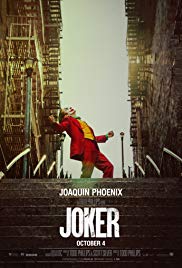
JOKER
US, 2019, 122 minutes, Colour.
Joaquin Phoenix, Robert De Niro, Zazie Beetz, Frances Conroy, Brett Cullen, Shea Whigham, Bill Camp, Glenn Fleshler, Leigh Gill, Josh Pais, Rocco Luna, Douglas Hodge.
Directed by Todd Phillips.
Joker won the Golden Lion in Venice before its release. Critics seem to be divided. Locally, Joker was dismissed as unimportant, the Age reviewer offering a condemnation, review by derision with derogatory comments, less rather than more relevant, about director director, Todd Phillips, “brazenly low-brow� because of his Eurotrip and Hangover series. “Making a career out of manchild movies and here is another�.
It will be interesting to see how Joker fares in award nominations.
Joker is a film about mental illness, a very powerful case study of extremes in mental illness. It is hard not to feel sorry for Arthur Fleck (Joker-to-be) for much of the time, his intense introspection, the disturbing maniacal neurological laugh and his difficulty in controlling it, erupting at all the wrong moments. That laugh will be one of the main features that will stay in the memory.
But, of course, with the name Joker, it is the clown imagery and metaphor that draws us in.
The first time we see Arthur he is pulling his lips aside to grin. He is not a natural laughter clown. Then he grimaces, the sad clown. Then he looks bereft, an orphaned clown, an institutionalised clown, a medicated clown. Where he succeeds best is in some sympathetic rapport with children. Where he fails, despite his scrawly and sketchy book of jokes, his attempts to tell them, is in his embarrassing gig as a stand-up comic in the club. As his mother remarks, “don’t you have to be funny to be a comedian?�. And this is the experience, unexpectedly videoed, played for mockery on television, that leads to his downfall.
Most commentators have remembered that Robert De Niro had a similar kind of role and aspiration in Scorsese’s King of Comedy. Now, De Niro has achieved his ambitions as the TV host who is ultimately merciless to Arthur though he agrees to introduce him as Joker.
At the beginning, we might wonder whether there would be any reference to Bruce Wayne or the Wayne family. The opening up is dramatically gradual: the family, mention of the name, the chaos in Gotham city and Thomas Wayne campaigning to be mayor, then the revelation about Penny Fleck working at the Wayne Mansion, suspicions about her pregnancy, about Arthur’s paternity, issues of adoption, Arthur search for documentation and visit to the mansion, encountering Alfred and the young Bruce, and the issues of Penny herself and her obsession with Thomas Wayne and her illusions. But we don’t expect the sequence where Arthur ultimately, and shockingly, deals with his mother.
Which brings up the question of violence. While we see Arthur/Joker in action, we have to remember the hardships of his upbringing and their uncertainties, the mental state of his mother, his own illness and neurological laugh, the sequence where the young men bully him in the street, the yuppie mockery in the subway train, the injustice of his boss firing him, the mockery from the other clown who gave him the gun – which means that Arthur becomes a ‘punishing clown’. A touch of kindness to the dwarf who never mocked him. But then, calling Murray to account on television, punishment by execution.
Yes, this is an “Origins� story, not the usual origins of the superheroes but rather the origin of Batman’s most notorious foe – which reminds us of Jack Nicholson’s maniacal glee and, more deadly notorious (and Oscar-winning) hostile madness of Heath Ledger. Of course, we are not meant to identify with Arthur’s and Joker’s increasing brutality, that would be a sign of mental illness. Rather, Gotham city is decaying, and Arthur is part of that decay.
Of course, Arthur/Joker is impact is in the writing, the director and his use of intense close-ups and framing, but the tribute must go to Joaquin Phoenix, emaciated, quietly and then openly deranged, lacking any sense of humour though desiring it, wanting an identity, donning make up (to cover Arthur, a new identity), wearing masks to hide but running the risk of their being torn off his face and his being recognised. It is a significant performance.
Joker is a significant film, contributing to and critiquing 21st-century culture.
1. Awards? Controversies?
2. The DC tradition, the Batman films, the variety of performance as Joker? Conflicts between Batman and Joker? Criminal, violent, clown appearance? Madness? Humour?
3. An origins film, the setting in 1980, Arthur Fleck, his name, his back story, creating a character and the influences on his life and his becoming Joker?
4. The Wayne link? Allusions, the gradual revelation, the twists? Penny Fleck? Working for Thomas Wayne? The paternity issue? The adoption issue? Abusive behaviour? Illusions? Wayne wanting to be Mayor of Gotham, chaos in Gotham? Penny’s madness, Arthur’s madness? The visiting the Wayne home, the encounter with Alfred and Bruce as a boy? His being turned away? Joker’s comments on Wayne on the television? The assassination of the parents? The final image of Bruce as a boy?
5. Joaquin Phoenix and his performance, screen presence? Sinister, different from other Jokers? His identity, with the make-up, without the make-up? Thin and emaciated, stooped, way of walking, skipping and dancing?
6. The clown imagery, the opening with the sad clown, grinning, grimacing, seemingly orphaned and abandoned, institutionalised, medicated? The make-up? His job, entertaining children? The reaction at his workplace? The ad in the street, the young group pursuing him, taking the ad, beating him, breaking the ad? The later encounter with the men on the subway? The clown with the gun and the children? His attempted stand-up comedy, failing, it being filmed? Shown on Murray’s show? The final make-up, wanting typical Joker, the clown shooting? His book of jokes and its indications of madness? The ambiguities?
7. The musical score, Send in the Clowns?
8. The film as a portrait of a mental condition? His mother, her treatment, the abuse, her dependence on him, meals, watching the television? Arthur’s mental state, the revelation of the neurological condition, the manic laughter, loud, continuous, as a motif throughout the film? People puzzled and put off? His experience in the institution, the diagnosis of his life? His going to the counsellor, his negative thoughts, accusing her of not listening? Government funding cuts and his being adrift? His boss, harsh, blaming him for the loss of the ad? Firing him? The clown, giving him the gun? The dwarf clown and his support? His mother, bullied, pampered but poor, his mother and care? Finding her letter, the continued comments on Thomas Wayne as a good man? His going to research the documents to find out the truth? Going to the Wayne mansion, the encounter with Alfred, his admiration for Murray’s show, imagining himself applauding, laughing, as a guest and honoured? The reality? Control and loss of control, the bullying and the stirring of anger and violence?
9. The portrait of his mother, ill, her story, memories of the Wayne family, real or not? At home, watching television? In the hospital, Arthur’s reaction and his killing her?
10. Sophie and the daughter, living in the apartment block, meeting in the elevator? Her sympathy, help, talk? Her finding Arthur in the apartment and her reaction?
11. The workplace, the unsympathetic boss and his being fired? The fellow clown, joking, bullying, giving him the gun? The sympathetic dwarf? The later visit, Arthur locking the door, the taunts of the clown, brutally killing him? The dwarf and his fear, not tall enough to unlock the door, after praising him, letting him out?
12. Robert De Niro as Murray, the television show, 1980s style, the guests, the talk, the jokes, the audience and the applause? Arthur imagining him on the show? Then seeing the footage of his club performance, the mockery? The agent phoning, the public interested in him? His agreeing to go to the show, the studio, the different make-up, the conversations with Murray and his producer, wanting to be called Joker, into the studio, kissing the doctor, his jokes, the book, the audience and applause, the Knock, knock? Murray interrogating him about the murders on the subway, the demonstrations? Arthur condemning him, for his mockery, shooting him? Audience reaction?
13. The men in the subway, Arthur and his frame of mind, their brutality, mockery, his shooting them? The chase, the railway station, getting rid of his clothes? The visits from the detectives, the interviews and questions? Questioning his mother? The media and the focus on the murders, the protests in the streets of Gotham, everybody disguised as clowns, the treatment of Arthur, the clowns rescuing him?
14. The background of Gotham, poverty, rats and illness, ineffectual authorities, the chaos, crime? Thomas Wayne and his promises as Mayor?
15. The comment that Joaquin Phoenix was not funny, that Joker was not funny – but that being this film is point about joker’s psyche?
Published in Movie Reviews
Published in
Movie Reviews
Saturday, 09 October 2021 13:00
Souvenir, The
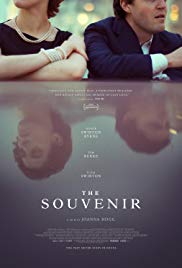
THE SOUVENIR
UK, 2019, 120 minutes, Colour.
Honor Swinton Byrne, Tom Burke, Tilda Swinton, Frankie Wilson, Hannah Ashby Ward, Barbara Pierson, James Dodds, Dick Fontaine, Steve Gough.
Directed by Joanna Hogg.
The souvenir is a British film aimed at the arthouse audience, certainly not aimed at the multiplex audience. And, response will certainly depend on mood and attention, some appreciation of the themes and performances, perhaps some impatience with the pace, and lack of empathy with some of the characters.
Writer-director, Joanna Hogg, has made several acclaimed arthouse features. This is a film about a young woman who has ambitions to write and direct films. She is Julie, played, in her first film although she appeared as a child with her mother in I Am Love. Her mother is Tilda Swinton who appears here in a pivotal role as Julie’s mother.
Julie has interviews with film boards, academic supervisors, mixes with fellow students, becomes involved with a young man, Anthony, who works in the Foreign Office. (These aspects of the synopsis may actually make The Souvenir more exciting and involving than it is.)
At times Julie is a dreamer, thinking of the central character of her film, from Sunderland in England’s north, quite different from her own rather comfortable London background. At times, she is more realistic in her interactions.
However, the central focus, apart from the making of the film, is on her relationship with Anthony. He is played by Tom Burke (who was persuasive as Cormorant Strike in the television versions of the detective thrillers by Robert K..Galbraith/ J.R.Rowling). Many in the audience will wonder at Julie’s falling in love with him but also her continuing to live with him, his ambiguous attitudes and activities, references to his Foreign Office work and his absences, his sometimes harsh behaviour towards her, his drug dependence.
So, this is a two-hour portrait of Julie, turning 25, trying to find her path in life, coming to terms with relationships, all in a very British setting.
And, as with the James Bond films and some of the superhero films, there is a final announcement at the end of the credits that The Souvenir 2 is coming. To be welcomed by fans – but, perhaps, rather ominous for others.
1. The title? Memories? Range of souvenirs?
2. The British story, London settings, the north of England? The city, flats, school, restaurants? Interiors? The countryside? The film sets? The musical score?
3. Julie story, her age, relationship with her parents, her mother’s visit and care, the conversations and meals with her mother and father? The study, ambitions, filmmaking? The scenario for the story about Tony, his origins, the north? The scenes of putting her screenplay to the board? With her friends, fellow students? The meal with Patrick and his wife, his curiosity and advice? Her relationship with Tony, the scenes together, her love for him, his work in the foreign office, drug dependency, his absences? Her welcoming him back, forgiveness? The visits to each as parents? The meals? His stealing her possessions? Buying drugs? Julie always taking him back? The news of his death, its effect? Her continuing to make the film, the 18th century souvenir? The into cutting of the scene of the landscape in the trees?
4. The parents, the bonds between them, with their children, Julie’s parents and the meals, talk about study? Her mother, the news of Tony’s death: “the worst�? Tony’s parents and their concern about him?
5. Tony, his background, age, the Foreign Office, his manner, meeting Julie, they’re living together, the apartment, the intimacy, space on the bed…? Yet his distance? Critique of her work and the academics? His absences, stealing, the drugs, his death?
6. The academic background, the lecturers and supervisors, interviews, advice?
7. The filming of scenes, Julie and her direction, the fashion shoot, the finale and the film, in the studio, her looking at the scenery? Themes of filmmaking, storytelling, craft, true stories?
8. The overall impact of the film, for an arthouse audience? Not for the general public?
Published in Movie Reviews
Published in
Movie Reviews
Saturday, 09 October 2021 13:00
King, The/ 2019
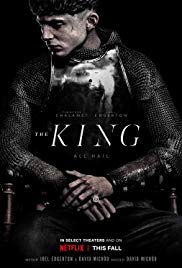
THE KING
UK/Hungary/Australia, 2019, 140 minutes, Colour.
Timothee Chalamet, Joel Egerton, Ben Mendelsohn, Sean Harris, Dean-Charles? Chapman, Lily- Rose Depp, Thomasin Mc Kenzie, Tara Fitzgerald, Tom Glynn- Carney, Andrew Havill, Edward Ashley.
Directed by David Michod.
In looking back over English history, especially in the Middle Ages and Renaissance period, the title of The King could well be claimed by Henry V. He came to prominence during the Hundred Years War between England and France, invading France, defeating the French at Agincourt, uniting the kingdoms for a time. However, the union was not to last – and, Joan of Arc was soon to come leading the French troops and defeating the English.
Henry V was immortalised by Shakespeare – and brought to life on screen by both Laurence Olivier and Kenneth Branagh.
However, in Shakespeare’s plays about Henry and his relationship with his father, Henry IV, there is a picture of a rather dissolute youth, Prince Hal, his seedy companions and the influence of Sir John Falstaff, large and bumbling, guide to the Prince and to be rejected by him as Hal became serious, took on responsibility, became Henry V.
The King is an ambitious film, written by the director, David Michod and the star, playing Falstaff with great panache, Joel Edgerton. The choice of an actor to play Henry V is quite interesting, perhaps unexpected, a rather gaunt young man, serious in appearance and manner, Timothee Chalamet who received an Oscar nomination for Call Me by Your Name. Ben Mendelsohn, who was most impressive as George VI in The Darkest Hour but who has played many larrikins offers an arresting cameo as Henry IV. Sean Harris is the adviser, William. Robert Pattinson, affecting a broken English accent, is the cynical and rather smug Dauphin.
Audiences who have no need to brush up their Shakespeare can be assured that this screenplay is literate, intelligent, echoes of the period but communicating to contemporary years. The writers offer an exhortatory speech by Henry on the eve of Agincourt, not once more unto the breach, but eloquent and stirring nonetheless.
The scenes of Prince Hal’s youth are brief, indicating the dissolute aspects, introducing Falstaff and his influence, enough for Henry IV to cut him off as heir. Throughout the film we have the opportunity to puzzle about how Hal made the change to the responsible and regal Henry, a skilful warrior, merciless in his killing, gaining the respect of his advisers and soldiers who initially are wary of him.
The bulk of the film takes place with the invasion of France, the siege of an imposing castle, an encounter with the Dauphin and defying him, and the detail of the battle of Agincourt, the strategies, to trap the French knights and their horses in muddy ground, hand-to-hand combat, even a scene where the Dauphin wants to fight Henry but is humiliated, cumbersome and unable to stand, in the mud. The sequences, staged in Hungary where the film was shot, bring home the harshness and brutality of close encounter warfare.
But, as with Shakespeare, the film does not end in battle and triumph but in the restoration of order, the uniting of France and England with Henry’s marriage to the daughter of the French King (Lily Rose Depp), and unmasking of traitors, peace for a time.
The King is an impressive excursion into history.
1. The title? Henry V of England? His father, Henry IV? The nature of Kings, rule, power? The use of war? The kings as males and warlike attitudes?
2. Audience knowledge of and interest in British and French history? The first half of the 15th century?
3. The background of Shakespeare, the two parts of Henry IV, Henry V? The range of characters, actual characters like the kings and Hotspur, the nobles? Fictitious characters from Shakespeare like Falstaff?
4. 21st-century version and interpretation? The strong screenplay? Literate? Paralleling Shakespeare’s poetry with literate prose? The strong cast?
5. The opening with the battle, introducing the audience to war? Hotspur, the battle, the survivor and his killing him ruthlessly and calmly? The issue of the war, issues of ransom, issues of loyalty, Hotspur and his hotheadedness, his father’s apologies? He his storming out of the meeting? Henry IV’s comments, condemnation of Hotspur?
6. The portrait of Hal, becoming Henry V? Age, personality, relationship with his father, the friends in Eastcheap, the friendship with Falstaff, dependence on him? Dissolute life? Yet introverted? His growing sense of responsibility, an era of war, his becoming a warrior, sailing to France?
7. Henry IV, his age, looking dishevelled, the meeting, the demand to see his son, his background as a usurper, his counsel, interaction with Hotspur, his demoting his son as heir? His younger son?
8. Hal and his change, how credible? A serious man? The clash with his brother Thomas, going to the battlefield, offering to fight single-handed? The battle, his skills, killing Hotspur? The news that Thomas was defeated in battle?
9. Henry IV, death, Hal’s visit, sitting beside his father’s bed?
10. Henry V, in court, the courtiers and advisers, his singling out Cambridge and others? Opening the gifts, the ball from the Dauphin? The discovery of the spy and the consequences? The decision to invade France?
11. The character of Falstaff, audience memories of Shakespeare, his past, in battle, carousing, the inn, the friends? Hal choosing him, his decision to go with Hal? Falstaff?
12. The invasion of France, the ships, the men, the range, the tents, supplies? Falstaff’s presence? The other advisers? The background of the exposure of Cambridge and their conspiracy? Hal watching the execution, merciless?
13. The Dauphin, his personality, speaking English, the accent, the touch of cynicism, the touch of playfulness? Hal meeting him? The discussions, no surrender?
14. The huge castle, laying siege to it, the fireballs, the camp, the meeting, but the difficulties for the men, supplies, illness? The question about attacking or continuing the siege?
15. The hardships, Hal and his prayer, consultations, making decisions?
16. Falstaff, his plan, sensing the rain in his knee, the advice, the alternate advice and spurn of Falstaff’s plan? The King’s decision? His travelling to defy the Dauphin? The Dauphin and his superiority?
17. The plan, the rain, the heavy cavalry from France, the English waiting in the woods, the horses, the descent, Falstaff and his troop confronting? The fierceness of the melee, the horses and others caught in the bog? The English firing the arrows? The intense fighting, the Dauphin and his confrontation of Hal, his slipping in the mud, his defeat? The victory but Falstaff’s death?
18. Meeting the King of France, his surrender, his observations on the situation, England and France and enmities? The proposal that Hal marry Catherine? Her frank talk, his pledge? The wedding and commitment?
19. On the ship, praising William for his loyalty, the information about the spy, the falsehoods, confronting William, his being measured for his clothes, on the steps, the king mercilessly killing him? The uniting of the kingdoms? The later history of Henry V, the reputation of the battle of Agincourt, Henry VI, Regency, the French confrontations, Joan of Arc, the Henrys of Lancaster, Richard III and York, the defeat by the Tudors? An opportunity to visualise and reflect on English 15th century history?
Published in Movie Reviews
Published in
Movie Reviews
Saturday, 09 October 2021 13:00
Hustlers
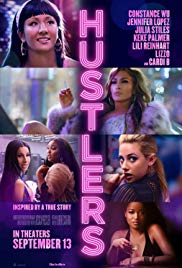
HUSTLERS
US, 2019, 110 minutes, Colour.
Constance Wu, Jennifer Lopez, Julia Stiles, Keke Palmer, Lili Reinhart, Mercedes Ruehl, Wai Ching Ho.
Directed by Lorene Scarafa.
The world of hustlers is generally a sleazy one – and this world is no exception (perhaps more so). Hustlers, men and women, are out to exploit other people for own advantage, predominantly for money (and exercising power and dominance) and, very often, sex. This is a money, power and sex story of hustling.
Interestingly, while the film has had favourable reviews, bloggers and many in the general public have not been so favourable, finding the story and treatment rather offputting, many considering the film both distasteful and boring. They are not entirely wrong.
The central character here is Dorothy, an Asian American, with the young daughter, caring for her grandmother. She is a minor pole dancer but with ambitions and determination to get finance for her family. She is played by Constance Wu (Crazy, Rich Asians). She becomes very friendly with Ramona, the star pole dancer for some decades, played with quite some exuberance by Jennifer Lopez, her fitness on display at age 49.
For audiences wanting a lot of pole dancing, their wishes will be fulfilled, especially in the first half of the film, loads of men tossing money, many girls twirling on the polls, and the audience spending a lot of time in the dressing (undressing) room. Jennifer Lopez even gives Dorothy, professionally called Destiny, a kind of tutorial on pole dancing movements (which does require some skill in movement, balance, and use of muscles).
The hustle is to trap as many men as possible, generally Wall Street financiers, seduce them, introduce the group who pass themselves off the sisters, get the men drunk, spike their drinks, max out their credit cards and abandon them. The victims often don’t remember what happened or are too embarrassed to remember. Several of the dancers form a team and prove themselves successful at the hustles. A couple of other women are invited in but prove to be unreliable. Eventually, the police are involved.
The action of the film moves around between 2007 and 2015 – and introduces a journalist who interviews Dorothy about the hustle. The film is, in fact, based on an article in New York Magazine. The journalist is played by a rather stodgy and humourless Julia Stiles.
There is a rather cynical final line from Jennifer Lopez who remarks that the whole country is like the con: “they toss the money, they do the dance…�.
While the women exploit the men (who are very much a sleazy lot), the thought comes up about a remake in which gender roles are reversed, a group of pole-dancing gigolos conning leasing female businesswomen. Me#Too questions and reactions? Actually, one blogger summed up a response which is worth considering, “Adults acting like bad children, passing it off as anti-establishment hyper-feminism�.
Published in Movie Reviews
Published in
Movie Reviews
Saturday, 09 October 2021 13:00
Love, Antosha
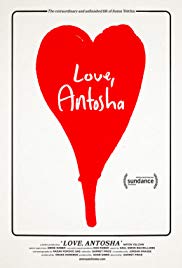
LOVE, ANTOSHA
US, 2019, 92 minutes, Colour.
Directed by Garrett Price.
This is a cinema portrait of the actor, Anton Yelchin, who sadly died in an accident at the age of 27. He suffered from cystic fibrosis which may have contributed to his death when he was pinned by his car against a wall. However, this film is a great celebration of his life and career.
The film is indebted to his parents, Victor and Irina, Russian ice skaters who left Russia at the end of 1989, a time of turmoil, a period of anti-Semitic action. They arrived in the United States with their baby son, settling in California. They have been very generous in supplying so much home video footage of their son, his growing up over the years, his exuberant personality and a great deal of performance. He was very bonded to his parents, as is also made clear in the footage. It is a tribute to his parents that they participate with so many interviews, saddened by his death but still able to give such strong and direct information about their son.
It is interesting to see Anton Yelchin as a little boy and his capabilities for performance, all kinds of performances – and testimonies from the friends from school.
While the film gives the timeline of his short life, it is also a reminder of the migrants who fled Europe, even at the end of the 20th century and found home and success in the United States.
The film offers psychological interpretation of the young boy and the young man, intellectual, a solid reader, critic, notetaker, experimenter, speaking both English and Russian, translating a book from Russian into English, taking up the guitar and leading a band, a photographer with a wide range of subjects and interests.
The film shows a great number of clips from his auditions, television programs, and a wide range of his films, indicating his seriousness, preparation for roles, the variety of roles and his interpretations, notes on screenplays, presence on the set, observing, having made short films as a boy and preparing a feature film the time of his death.
It is also a tribute to him that the number of talking heads commenting on their experiences with him, their working with him, is much more extensive than the average film, actors, especially from Star Trek) offering their experiences and insights, quite a number of directors, as well as experts on his health.
The film uses the device of showing the notes on the screenplays, of writing on screen various letters and cards, comments – and, unexpectedly, he is voiced by Nicolas Cage who renders them with great feeling.
The story of someone who might have been a great screen presence but whose life was tragically cut short.
Published in Movie Reviews
Published in
Movie Reviews
Saturday, 09 October 2021 13:00
Queen of Blood
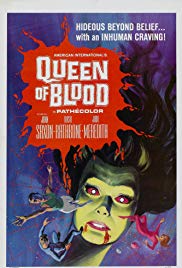
QUEEN OF BLOOD
US, 1966, 78 minutes, Colour.
John Saxon, Basil Rathbone, Judi Meredith, Dennis Hopper, Florence Marly, Robert Boon, Don Eitner.
Directed by Curtis Harrington.
Released in 1966, it is one of those B-budget science fiction films from the 1950s and 1960s that have something of a cult following.
Perhaps its greatest significance is that its Dir and writer, Curtis Harrington, said that it was a strong influence on Alien. And, this is repeated in the documentary released on the 40th anniversary of Alien, memory: the Origins of Alien.
While the film was released three years before the moon landing, it is set in a futuristic (for 1966) time, 1990. By that stage, according to the screenplay, travel to the moon was comparatively easy and there were centres already built their. There are also voyages to Mars – and, the screenplay seems to digest that it was comparatively easy to pop up to Mars and back.
John Saxon and Jenny Mulgrave are the two central astronauts. Also in the cast is a very young -looking Dennis Hopper. And there is some gravitas at the space Centre with Basil Rathbone as the leader.
There is a lot of discussion about the space program at the time, the role of astronauts, the regimes, journeys to the moon, exploration tomatoes, being stranded on moon is beyond Mars.
Eventually, during a visit, the astronauts discover a spacecraft and a female alien. She is taken for observation and for the world to discover more about interplanetary life. However, Green in appearance, it turns out that she has vampire tendencies and savages some of the male crew. She has a very sinister smile – but, is destroyed after being scratched and her green blood leads to her death.
However, in Alien fashion, she has left a large number of eggs throughout the earth spacecraft and the final scene focuses on them – and the implication for the human race.
Published in Movie Reviews
Published in
Movie Reviews
Saturday, 09 October 2021 13:00
Parade/ 1973
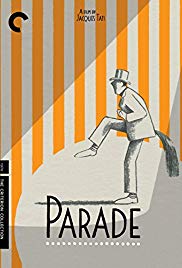
PARADE
France, 1974, 85 minutes, Colour.
Jacques Tati.
Directed by Jacques Tati.,
Parade is the last film by renowned comedian and mime, Jacques Tati. While he appeared in some films early in his career, including a number of short films, he made his main impact in the late 1940s with Jour de Fete which was followed by the classics Mon Oncle, Playtime, Traffic.
This is a film version of an elaborate circus performance at the Tennis Centre, Roland Garros, in Paris.
The early sequences show the range of crowds coming in for the performance, some in costume, old and young, with a focus on a little girl and her mother and a little boy sitting next to his father. They become involved in the action throughout the performance.
As the show warms up, the audience in the cinema audience become more and more involved with the range of acts. All the time throughout the show, workers, in workers’ clothes and overalls, are continually preparing the props for the performance, huge signs, artistic devices, spray-painting balls, a great deal of movement. In fact, many of these artists are very skilled in their performances. There is a piano which is turned on its side and becomes a horse for jumping over, members of the cast in all kinds of different costumes, including orchestral, military, interspersing the action with their awkward leaping over the horse.
There are some amusing music magician sequences, one of the workers being more skilled than the official magician – and an intervention from a member of the audience.
There are a great number of musicians, orchestral pieces, clowns coming on and playing with different instruments, singer Pia Colombo also appearing and singing. And there are some disputes and slapstick between members of the orchestra. There are also Russian dancers as well as flamenco performers.
There is an elaborate pony sequence where members of the audience try to ride the pony and, in slapstick fashion, fail. There is a balding bespectacled older gentleman from the audience who continues to try. Ultimately, it is the little boy who is sometimes bored, sometimes involved, who is successful.
The juggling is quite outstanding, a woman and two men juggling feather dusters in a great number of combinations including each standing on the other shoulders, juggling the dusters which hit the wall in painted patterns.
However, the star of the whole show is, of course, Jacques Tati. And, once again, his mimes are brilliant and audiences will be glad of the opportunity to see them, miming tennis, miming boxing, miming equestrian performance, miming police in London and Paris, miming fishing… If these pieces were edited together they would be a fine final tribute to Tati and his skills.
The film ends with everybody leaving, the little girl and the little boy playing on the stage, in the wings, and finally with their parents.
Published in Movie Reviews
Published in
Movie Reviews
Saturday, 09 October 2021 13:00
Maiden
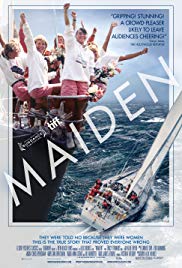
MAIDEN
UK, 2019, 98 minutes, Colour.
Tracy Edwards and the crew of Maiden.
Directed by Alex Holmes.
Women in sport has been a significant development, especially since the latter decades of the 20th century. They played tennis, other more genteel sports. But, in later years, they play cricket, the various forms of football, boxing, writing as jockeys (Australia’s Ride Like a Girl)… And, with the impact of this film and its story, vying with men in sailing around the world.
The Whitbread race, from Southhampton, through the Atlantic, across the Indian Ocean, into the Pacific, and back to Southhampton, was instituted in the 1980s. The particular race, 1989-1990, is the occasion for this story.
The telling of the story is fairly straightforward in terms of filmmaking. It moves with the narrative of preparation for the race, the gathering of the crew, the race itself and its details (with crew members filming as they sailed), the triumph and the extraordinary welcome of all the boats at Southhampton. Fortunately, the members of the crew were filmed during those years so there is plenty of stock footage to draw on. And, they are available for interview, talking heads for this film.
So, there is a feeling of authenticity in looking at the events of the past, seeing the various women in action, and then listening to them as they reflect after almost 30 years.
At the centre of the story is Tracy Edwards. The early part of this documentary traces her background, her life as a child and teenager, her friendships, the sadness of her father’s sudden death, the difficulties of relating to her stepfather and her running away. She had a spirit of adventure, even getting a job as a cook on a boat. She gave no indication that she would be the skipper of the Maiden let alone leading her team to victory.
The narrative is interesting in showing how Tracy Edwards was led to her decision to race, gathering the crew, the difficulties of getting any kind of sponsorship, male chauvinistic derision, the years spent in preparation with the boat, the final support of King Hussein of Jordan.
Again, with the range of video, we see her as an enthusiastic young woman at sea and look at her as a rather dignified older woman, more gaunt, more restrained – but still as enthusiastic as she remembers her past. And, she makes tribute to her team, giving all the background to each of them, the film showing them all in action, and, again, their reflections after almost 30 years.
Some of the talking heads are sailors of the yachts, not immediately sympathetic to the idea let alone the reality of women participating in the Whitbread. And, there are a couple of journalists, reminding us of the chauvinism as regards women in sport.
The women are engaging, and still energetic and enthusiastic, so that the audience is interested in them and in what they achieved. And, the footage at sea brings home some of the harsh realities of the challenges of the oceans.
But, we are all on side as, unexpectedly for them, they find themselves in the lead an enormous number of boats and people coming out to meet them and welcome them across the line.
Published in Movie Reviews
Published in
Movie Reviews